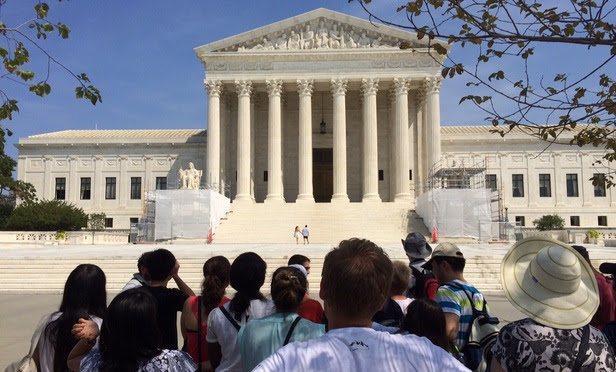Labor of Law: Driving Labor Law Into the Gig Economy
Uber is working with labor leaders to create a “portable benefits plan” for drivers in Washington state. Plus, the downside of banning questions about salary history.
January 25, 2018 at 09:30 AM
6 minute read
Welcome back to Labor of Law. This week, we're highlighting questions about where labor law fits into the gig economy, a big business push for new benefits thanks to tax reform and what a salary history ban could mean. Send me your story ideas or just say hi: [email protected] or @erinmulvaney on Twitter.
➤➤ Want to receive my weekly labor & employment law update straight to your in-box? Click here to sign up.
How Does the Gig Economy Fit into Labor Law?
New technology. Old questions. That's the perspective of former National Labor Relations Board general counsel Richard Griffin Jr., who was among the panelists this week at the Bloomberg Next webinar “2018 Outlook on Labor and Employment: Hot Topics and the Future of Work.” Griffin, now counsel to Bredhoff & Kaiser in Washington, says there's nothing new in one of the central questions of the gig economy: Are workers employees or independent contractors? Some of the first major labor cases before the Supreme Court focused on that issue—such as whether newspaper delivery people were considered contractors or employees.
Sharon Block, a former NLRB member and now executive director of Harvard Law School's Labor and Worklife Program, had this to say: “I think there is a tendency to get distracted by the bright, shiny object of technology. To assume that because technology is involved doesn't mean that standards don't apply. The standards of the relationship isn't changed.”
Epstein, Becker & Green member Paul DeCamp says there's a role for Congress in the fight: “The big picture here is that with the current state of the law, it would be structurally better if Congress could resolve this rather than the political winds going back and forth.” The target keeps moving for gig companies and that's the central issue, DeCamp says.
Griffin says companies aren't entitled to a pass… “There is a societal expectation you will run your enterprise based on existing statute. You can't start something and not make a considered judgment.”
Pushing for a solution? Uber Technologies and a union are partnering to create a “portable benefits plan” for drivers in Washington state, home to a closely watched case centered on the labor rights of contract workers.
From an open letter from Uber CEO Dara Khosrowshahi, David Rolf, President SEIU 775 and Nick Hanauer, Founder Civic Venture Partners:
“We firmly believe that renewing the social contract is both urgent and important. We acknowledge that developing a first-of-its-kind scheme will involve business impacts, implications for worker and consumer protection, complexity in market design and regulatory framework and the need for prudential standards.”
This is only one proposed effort to solve the the question over how to fit the gig economy into existing labor structures. Other proposals talk about a third classification of worker. There are high stakes on both sides. An NPR/Marist poll released this week shows contract work is booming, with 32 million Americans currently making their living that way.
Corporate Outlook: Post Tax Reform, and New State Laws
Amazon says it won't ask prospective hires for salary history, BuzzFeed News reports. Managers cannot “directly or indirectly ask candidates about their current or prior base pay, bonus, equity compensation, variable pay, or benefits” or “use salary history information as a factor in determining whether or not to offer employment and what compensation to offer a candidates.” The move comes as state and local jurisdictions adopt measures to promote pay equity.
Other tech giants, including Google and Facebook, have banned recruiters from asking questions about salary history. A case was recently heard in the U.S. Court of Appeals for the Ninth Circuit that directly confronts whether an employer was permitted to rely on salary history to justify pay differences.
Quartz has a different take: The movement could backfire—leading employers to make false assumptions about how much a woman makes. The article suggests this happened with similar “ban the box” initiatives to keep employers from discriminating against black applicants. Employers made assumptions about black candidates they wouldn't make about white men.
Big businesses are promising new benefits. Starbucks Coffee Companyis planning wage increases, new paid sick time for all its employees and a stock plan, in part citing tax reform as reason for its sudden generosity. Disney and Walmart also added additional paid leave benefits. (Walmart also previously announced higher wages but it still falls behind its competitor Target, which offers $15 as a minimum wage.) Visa and Nationwide Mutual Insurance announced they would be offering higher matches on 401K plans. Others expanded benefits in health care offerings.
The New York Times put together a chart showing the major corporations focused on new paid leave policies, which has become a major motivator for companies seeking to retain employees. The Times points out that the United States is the only industrialized country not to mandate paid parental leave, which makes these corporations announcements significant. McDonald's, IBM and AT&T also recently expanded their leave benefits.
Around the Water Cooler
Here's a rundown of headlines and happenings…
U.S. Labor Department moves to shield in-house judges. Secretary Alexander Acosta wanted to “lift the cloud of uncertainty” surrounding the agency's 40 administrative law judges after the Trump administration switched sides in the Supreme Court. [National Law Journal]
Google CEO defends the firing of the engineer whose memo went viral.Sundar Pichai says he does not regret firing James Damore for his fiery memo criticizing the company for its diversity efforts. [The Verge]
How William Emanuel resolved conflicts. The NLRB member and former Littler Mendelson partner recused himself from dozens of cases but used other vehicles to cast votes on related issues. [ProPublica]
McDonald's joint-employer case is on hold amid settlement talks.Another mark of the influence of new NLRB general counsel Peter Robb. [Reuters] Tech lobbying groups push for diversity. The Internet Association, the voice for tech giants, is pushing an initiative to try to improve diversity in the predominantly male industry. [Recode]
Still waiting for shutdown pay. Some federal employees who worked during the 2013 shutdown are still waiting for pay. We talked to the lead attorney in that case. [National Law Journal]
How much to say about that fired employee? In the wake of the #MeToo movement, companies are grappling with questions typically resolved quietly by human resources departments. What's the right balance? Managament lawyers offer perspective. [Corporate Counsel]
That's all for this week and thanks for reading. Tips? Thoughts? Reach me at [email protected]
This content has been archived. It is available through our partners, LexisNexis® and Bloomberg Law.
To view this content, please continue to their sites.
Not a Lexis Subscriber?
Subscribe Now
Not a Bloomberg Law Subscriber?
Subscribe Now
NOT FOR REPRINT
© 2025 ALM Global, LLC, All Rights Reserved. Request academic re-use from www.copyright.com. All other uses, submit a request to [email protected]. For more information visit Asset & Logo Licensing.
You Might Like
View All
NLRB Blisters Skilled Care Home Chain That Terminated Nursing Assistant Who Complained About Wages
6 minute read

3rd Circuit Strikes Down NLRB’s Monetary Remedies for Fired Starbucks Workers

In Lawsuit, Ex-Google Employee Says Company’s Layoffs Targeted Parents and Others on Leave
6 minute readTrending Stories
Who Got The Work
Michael G. Bongiorno, Andrew Scott Dulberg and Elizabeth E. Driscoll from Wilmer Cutler Pickering Hale and Dorr have stepped in to represent Symbotic Inc., an A.I.-enabled technology platform that focuses on increasing supply chain efficiency, and other defendants in a pending shareholder derivative lawsuit. The case, filed Oct. 2 in Massachusetts District Court by the Brown Law Firm on behalf of Stephen Austen, accuses certain officers and directors of misleading investors in regard to Symbotic's potential for margin growth by failing to disclose that the company was not equipped to timely deploy its systems or manage expenses through project delays. The case, assigned to U.S. District Judge Nathaniel M. Gorton, is 1:24-cv-12522, Austen v. Cohen et al.
Who Got The Work
Edmund Polubinski and Marie Killmond of Davis Polk & Wardwell have entered appearances for data platform software development company MongoDB and other defendants in a pending shareholder derivative lawsuit. The action, filed Oct. 7 in New York Southern District Court by the Brown Law Firm, accuses the company's directors and/or officers of falsely expressing confidence in the company’s restructuring of its sales incentive plan and downplaying the severity of decreases in its upfront commitments. The case is 1:24-cv-07594, Roy v. Ittycheria et al.
Who Got The Work
Amy O. Bruchs and Kurt F. Ellison of Michael Best & Friedrich have entered appearances for Epic Systems Corp. in a pending employment discrimination lawsuit. The suit was filed Sept. 7 in Wisconsin Western District Court by Levine Eisberner LLC and Siri & Glimstad on behalf of a project manager who claims that he was wrongfully terminated after applying for a religious exemption to the defendant's COVID-19 vaccine mandate. The case, assigned to U.S. Magistrate Judge Anita Marie Boor, is 3:24-cv-00630, Secker, Nathan v. Epic Systems Corporation.
Who Got The Work
David X. Sullivan, Thomas J. Finn and Gregory A. Hall from McCarter & English have entered appearances for Sunrun Installation Services in a pending civil rights lawsuit. The complaint was filed Sept. 4 in Connecticut District Court by attorney Robert M. Berke on behalf of former employee George Edward Steins, who was arrested and charged with employing an unregistered home improvement salesperson. The complaint alleges that had Sunrun informed the Connecticut Department of Consumer Protection that the plaintiff's employment had ended in 2017 and that he no longer held Sunrun's home improvement contractor license, he would not have been hit with charges, which were dismissed in May 2024. The case, assigned to U.S. District Judge Jeffrey A. Meyer, is 3:24-cv-01423, Steins v. Sunrun, Inc. et al.
Who Got The Work
Greenberg Traurig shareholder Joshua L. Raskin has entered an appearance for boohoo.com UK Ltd. in a pending patent infringement lawsuit. The suit, filed Sept. 3 in Texas Eastern District Court by Rozier Hardt McDonough on behalf of Alto Dynamics, asserts five patents related to an online shopping platform. The case, assigned to U.S. District Judge Rodney Gilstrap, is 2:24-cv-00719, Alto Dynamics, LLC v. boohoo.com UK Limited.
Featured Firms
Law Offices of Gary Martin Hays & Associates, P.C.
(470) 294-1674
Law Offices of Mark E. Salomone
(857) 444-6468
Smith & Hassler
(713) 739-1250










